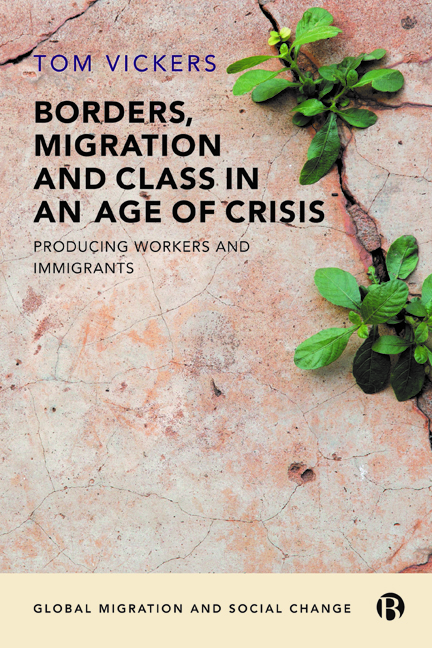Book contents
- Frontmatter
- Dedication
- Global Migration and Social Change
- Contents
- List of Figures and Tables
- Acknowledgements
- Series Preface
- 1 Introduction
- 2 Imperialism, Migration and Class in the 21st Century
- 3 Deconstructing Migrant Crises in Europe
- 4 Deconstructing Welfare Crises
- 5 Mobility Power and Labour Power in the Crisis of Imperialism
- 6 Deconstructing Migrant/Worker Categories in Britain
- 7 Conclusion
- Appendix: Methodology
- References
- Index
3 - Deconstructing Migrant Crises in Europe
Published online by Cambridge University Press: 30 April 2022
- Frontmatter
- Dedication
- Global Migration and Social Change
- Contents
- List of Figures and Tables
- Acknowledgements
- Series Preface
- 1 Introduction
- 2 Imperialism, Migration and Class in the 21st Century
- 3 Deconstructing Migrant Crises in Europe
- 4 Deconstructing Welfare Crises
- 5 Mobility Power and Labour Power in the Crisis of Imperialism
- 6 Deconstructing Migrant/Worker Categories in Britain
- 7 Conclusion
- Appendix: Methodology
- References
- Index
Summary
Introduction: immigration policy and the crisis of imperialism
Bassel and Emejulu (2017: 3) suggest that England is ‘experiencing a backlash against multiculturalism … fuelled by an existential crisis of national identity’. The origin of this crisis of national identity can be found in the crisis of imperialism. British capitalism is simultaneously highly dependent on capturing surplus value produced in other parts of the world (see Chapter 2) and incapable of defending its international interests alone. This produces contradictory tendencies towards national protectionism and collaboration with other imperialist states. The capitalist crisis is both fuelling rivalries between the imperialist powers, making cooperation more difficult, and reducing the material concessions that can be afforded to sections of the working class within Britain, increasing the importance of racism, nationalism and other ideological means of securing loyalty to the ruling classes. This echoes the rise of national protectionism, racism and xenophobia in many imperialist countries in an earlier period of crisis at the end of the 19th century (Mishra, 2018: 3).
The capitalist crisis has made the international struggle for sources of profit increasingly desperate, and this has contributed to an aggressive militarised foreign policy by imperialist states. Military interventions have combined with support for non-state proxy forces and repressive states, as well as concentrations of poverty and environmental degradation in many oppressed countries to put pressure on people to move internationally as a matter of survival. In 2015,12.4 million people were newly displaced, although not all crossed an international border, and the proportion of the world's population who are migrants has remained consistent for decades (Crawley et al, 2018: 14). Restrictions on migrants’ rights, reinforced by racism, serve both to insulate imperialist countries against the worse consequences of imperialist crisis and to create special conditions of legal and social insecurity that enable a reduction of wages and conditions. Defining a state of crisis through migration has involved:
• material elements (such as checkpoints, immigration prisons and guards), restrictions on migrants’ access to resources and militarised attacks on migrants and those assisting them;
• the legal identification of human beings through migrant categories;
• cultural representations of migrants that are classed, racialised and gendered; and
• ideological definitions of the crisis as caused by people moving rather than the borders that define and impede that movement.
- Type
- Chapter
- Information
- Borders, Migration and Class in an Age of CrisisProducing Workers and Immigrants, pp. 55 - 94Publisher: Bristol University PressPrint publication year: 2019



